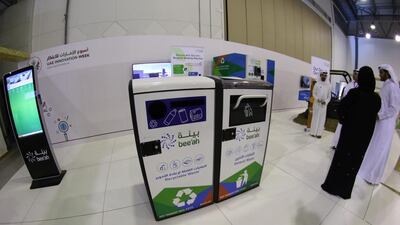As the UAE continues to cement its position as a modern, progressive Arab state that has taken a leadership role in facilitating sustainable development, there is much to be proud of. No one can deny that we have come a long way in a very short space of time and that our lives have improved immeasurably in just a few generations.
We cannot, however, allow our successes to obscure the fact that we face great challenges if we are to build on our position of strength, in order to ensure a sustainable future for this country. The first step to delivering such a future lies in the adoption of a circular economy, as advocated in the UAE Vision 2021 national agenda. This will support social and economic growth that is in alignment with environmental objectives.
There are a number of key principles that will support the establishment of a circular economy in the UAE. Firstly, waste needs to be diverted away from landfill and reintegrated into the economy by recycling, repurposing or refurbishing.
In a circular economy, businesses, statutory authorities and individuals seek to maximise the inherent usefulness, as well as the value, of the energy that has been invested in a product, before eventually reintegrating it back into the economy. When an item reaches the end of its useful life, through reintegration, it can become the input to create new cash flow and enhance natural capital, instead of adding to the insurmountable issue of waste disposal. Eventually all products will be designed and built with reintegration in mind, but until such time as this happens, it is up to us to develop new and creative ways of using the vast array of materials which surround us.
Secondly, a new approach needs to be adopted to the generation of clean energy, which concentrates on both natural renewable sources and innovative new technologies, such as converting waste into energy.
Powering the economy through clean sources of energy is pivotal to the adoption of a model of restoration. Conventional sources of energy follow a linear model, where energy is produced, used and then disposed, without adding further value. However, renewable sources of energy like wind and solar are regenerative by design and negate the need to consume finite resources. In diversifying our energy portfolio, we can also adopt innovative sources of energy that serve multi-fold purposes. While some types of waste might be usefully repaired, recycled or repurposed, non-recyclable waste is usually diverted to landfill, ensuing in the loss of energy and value contained in these materials. Waste-to-energy offers great potential in the treatment of such materials by using them to generate energy, thus ensuring diversion from landfill, in addition to supplying clean energy.
_______________________
Read more from Opinion
Adnan Amin: The falling cost of renewables brings new economic opportunity to the Gulf
Razan Al Mubarak: The Arabian Gulf is a living system that we need to preserve
Afshin Molavi: One of the defining features of our century will be the rise of the Asian city
Saeed Mohammed Al Tayer: It will require concerted effort to achieve a sustainable future
_______________________
The third principle for the adoption of a circular economy that is sustainable socially, economically and environmentally, is to drive public engagement and commitment towards addressing this common cause.
To make a circular economy work requires a holistic approach, which includes a heavy emphasis on education within schools as well as other initiatives which engage and educate the general population. It is vital that every member of society understands what is expected of them, in terms of behaviour around energy consumption, waste disposal and recycling. This necessitates a long-term approach to education and public engagement that is supported by our government on a national basis. Our experience suggests that a willingness to adopt more sustainable ways of living already exists within the general population. It is therefore up to us and others in a similar position, to harness and nurture that desire to do what is right for the environment and ensure we convert it into positive action.
Finally, a sustainable, circular economy will need transitioning towards sustainable consumption patterns. Globally, rampant consumerism is leading to sky high levels of consumption, in both the developed and developing world. These levels of consumption are, in turn, distorting and destabilising what should be a balanced relationship between how things are made, consumed and disposed of. In the past, excessive consumption was viewed as a driver for economic growth. However, it is increasingly being recognised that this type of growth triggers resource depletion and climate change. In order to ensure effective functioning of the ecosystem and to maximise the yield of our resources, consumption should be regulated to meet needs and not wants.
Industry leaders should envision and embrace a system that creates products with longer consumption life cycles, and the potential for recovery at the end of its useful life. In terms of manufacturing, this offers opportunities for innovation and creativity in product development, as well as sustainable sources for raw materials. A symbiotic relationship between waste management establishments, green energy providers and the wider business community is required to ensure the shift to a circular economy.
It is an irrefutable fact that the challenges that lie ahead are significant. However, under the UAE's wise leadership, supported by the resilient spirit of our people, the nation has, and will continue to excel in its attempts to lead positive change in the region. This leadership is exemplified at major gatherings such as Abu Dhabi Sustainability Week, which brings together leaders from across government, business and academia, providing a vital platform for sharing knowledge and agreeing shared action. As a rapidly growing country, the UAE's adoption of a circular economy will enable us to sustain this growth, while setting an example for many others to follow.
Khaled Al Huraimel is group CEO of Bee’ah. The environmental management company will be participating in the Waste Management Solutions Forum during Abu Dhabi Sustainability Week

